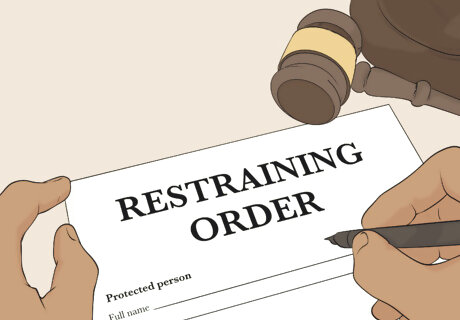
views
- Your ex might try to delay the divorce by changing lawyers multiple times or refusing to answer your messages.
- They might also quit their job to avoid paying child support or alimony payments.
- Your ex might hide their assets by transferring them into another person’s name without telling you.
- Fight back by hiring a good lawyer and letting them guide you through your divorce proceedings.
Tactics to Watch Out For

Delaying or stalling the divorce If your spouse doesn’t want a divorce or they just want to make your life as hard as possible, there are ways they can drag out the proceedings for much longer than they need to go. They might fight you tooth and nail on every little aspect, or they might change attorneys and suddenly have to start the entire process over.

Rushing toward a quick settlement On the flip side, some people want to get as much money out of you as possible, so they’ll take advantage of the fact that you want to be done with the proceedings fast. Your spouse might rush you into signing things you haven’t fully read, or pressure you into agreeing to a settlement that doesn’t benefit you.

Quitting a job to reduce (or avoid) child support In most states, child support and alimony payments are based on someone’s income. If your spouse doesn’t want to pay out every month, they might quit their job to avoid having any income coming in at all.

Hiding or lying about assets Your assets are another way a court decides how much you have to pay every month. Assets, like cars, homes, and businesses, all contribute to that amount. If your spouse doesn’t want to pay their fair share, they might transfer their assets to another person’s name, make a large purchase in someone else’s name, or not disclose their account information.

Alienating children from the other spouse If you and your spouse have children together, unfortunately, they can be used as tools during a divorce. Your spouse might talk badly about you to your children or tell your kids that you don’t love them in order to turn them against you. This can affect custody hearings, especially if your children are old enough to decide who they want to live with.

Resisting communication or negotiations During divorce proceedings, there are a lot of meetings that both you and your spouse (and your lawyers) need to be present at. Your spouse might drag their feet by not responding to texts or emails or claiming that their busy schedule won’t allow for them to meet.

Requesting more custody to reduce child support If you and your spouse end up splitting custody 50/50, the court likely will not grant you as large of a child support payment. Even if your spouse doesn’t want custody of the children, they might push for it to lower their own payout every month.

Making false allegations If your spouse wants to manipulate the court into giving them more money or support, they may even stoop so low as to accuse you of domestic abuse, substance abuse, or criminal activity. Your spouse might also claim that you’ve financially, emotionally, or physically abused them in the past so that you don’t get custody of your children or you lose access to alimony or assets.

Filing a restraining order Restraining orders are typically used when there’s been some type of abuse or domestic violence. However, your spouse may file a restraining order to force you out of the marital home and prevent you from seeing your children anymore. Typically, restraining orders set the tone for the rest of the divorce proceedings, and they can affect how a judge rules on custody and child support.
Fighting Back

Get a good lawyer from the beginning. Finding a good divorce attorney will help you advocate for what you need and make sure your spouse doesn’t pull anything tricky. Search in your area for a good divorce lawyer with lots of experience, then explain your concerns about your spouse to them. The more your lawyer is prepared for your spouse’s sneaky tactics, the better they can help prepare you for them.

Have your lawyer look over paperwork before signing. Your spouse likely wants you to blindly sign agreements without reading them first, and that’s exactly what you’re not going to do. Always have your lawyer read any agreements, and don’t feel pressured into signing something that doesn’t benefit you.

Investigate your spouse’s financial habits and spending. If you think your spouse is being shady about their assets or their incoming, ask your lawyer to do some digging. With some sleuthing work, your lawyer can likely prove to the court that your spouse is lying about their finances (or at least lying by omission). If you’re in a serious situation, consider hiring a forensic accountant. These professionals can dig deep into someone’s financial history using bank records and online credit reports. You can also ask your lawyer or a judge to subpoena your spouse’s employer to get records of their income. If a judge discovers that your spouse is lying, they may have to pay a fine or relinquish the rest of their assets to you.

Keep your children’s best interests in mind. If you have children, it’s important to remember that the divorce isn’t just about you and your ex. Always push for what’s best for your children, and show the judge that you’re keeping their best interests at heart. For instance, maybe your kids are still in school. You might move to a new home within that school district to show a judge that you’re committed to keeping your kids comfortable in their existing school.

Document any failures to communicate. If your spouse is dragging their feet, you can prove that in court. Every time your spouse fails to show up to a meeting or doesn’t respond to your messages for days at a time, make a note of it. It’s likely that a judge will rule in your favor if you can prove that your spouse is intentionally delaying things.
What to Avoid

Fighting fire with fire When your ex is playing dirty, it’s no surprise that you’d probably want to retaliate against them. However, stooping to your ex’s level can actually backfire, and it could cause a judge to rule against you. Always take the high road so that you can prove to the court that you’re a responsible, mature adult (and your ex isn’t).

Leaving town with your children Taking your children out of town (or out of state) can be seen as a way to keep them from your ex, even if that wasn’t your intention. Until custody has been set and visitations are scheduled, keep your kids in the same town as your ex-spouse.

Cleaning out joint bank accounts Emptying your bank accounts without your spouse’s permission can be detrimental for your case. Even if your spouse has already pulled some nasty tricks during divorce proceedings, taking all the money in a joint account is a big no-no. Instead, leave the money where it is and ask your lawyers to talk about closing the account and splitting the money. Unfortunately, you can’t take your ex’s name off of a joint account without their permission. Similarly, don’t cancel any joint credit cards you two hold, either. Removing your spouse’s access to money can be seen as a scare tactic, and it could cause a judge to rule against you.

Talking about the divorce on social media Even if your social media pages are private, there are still ways for your ex or their lawyer to access them. Blasting your spouse on social media can paint you in a bad light, and it could lead to a judge ruling against you. When in doubt, don’t make any posts online that could come back to bite you. It’s fine to vent to friends or family members as a way of dealing with the pain of divorce. However, don’t bad mouth your ex, especially online or in a public place.

Humiliating your spouse or jeopardizing their job When your ex has put you through the ringer, it’s probably tempting to serve them divorce papers in a way that might embarrass them (or cause trouble in their workplace). However, this can reflect poorly on you, especially if a judge has to look at your case. Plus, jeopardizing your ex’s job can affect how a judge rules during alimony or child support hearings.


















Comments
0 comment